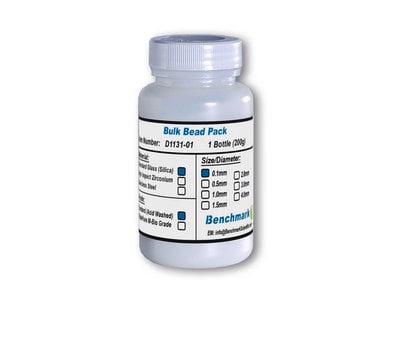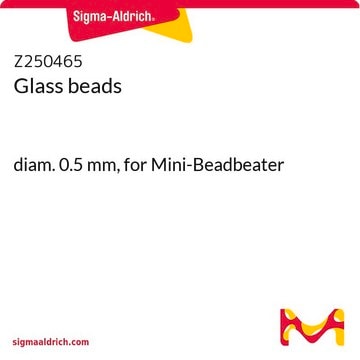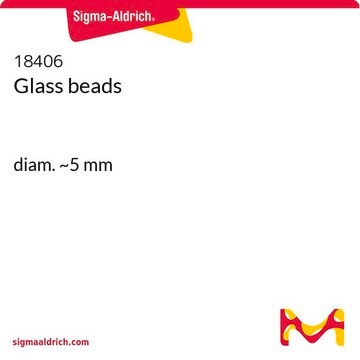G4649
Glass beads, acid-washed
≤106 μm (−140 U.S. sieve)
Synonym(s):
Glass beads
Sign Into View Organizational & Contract Pricing
All Photos(4)
About This Item
UNSPSC Code:
41102422
NACRES:
NB.22
Recommended Products
Application
Acid-washed glass beads have been used:
- in the homogenization of mice retinas to extract and detect phosphatidylinositol
- to extract RNA from Lactarius quietus ectomycorrhizas (ECMs)
- to extract cytokinin-binding proteins (CBP) from Synechocystis lysate
Storage Class Code
11 - Combustible Solids
WGK
WGK 3
Flash Point(F)
Not applicable
Flash Point(C)
Not applicable
Personal Protective Equipment
dust mask type N95 (US), Eyeshields, Gloves
Choose from one of the most recent versions:
Certificates of Analysis (COA)
Lot/Batch Number
Don't see the Right Version?
If you require a particular version, you can look up a specific certificate by the Lot or Batch number.
Already Own This Product?
Find documentation for the products that you have recently purchased in the Document Library.
Customers Also Viewed
Xingsheng Hou et al.
PloS one, 9(12), e114435-e114435 (2014-12-17)
FlcA is a response regulator controlling flocculation and the morphological transformation of Azospirillum cells from vegetative to cyst-like forms. To understand the cellular responses of Azospirillum to conditions that cause morphological transformation, proteins differentially expressed under flocculation conditions in A.
Yoko Hayashi-Takanaka et al.
Nucleic acids research, 39(15), 6475-6488 (2011-05-18)
Histone modifications play an important role in epigenetic gene regulation and genome integrity. It remains largely unknown, however, how these modifications dynamically change in individual cells. By using fluorescently labeled specific antigen binding fragments (Fabs), we have developed a general
Gene Transcription in Lactarius quietus-Quercus petraea Ectomycorrhizas from a Forest Soil.
Corty PE, et al.
Applications of Environmental Aquatic Chemistry: A Practical Guide, Second Edition, 74(21), 6598?6605-6598?6605 (2008)
Che-Chou Shen et al.
IEEE transactions on ultrasonics, ferroelectrics, and frequency control, 66(1), 26-37 (2018-11-08)
Hadamard-encoded multipulses (HEM) transmit has recently been utilized for tissue background suppression in ultrasound contrast imaging to enhance the contrast-to-tissue ratio (CTR). Nonetheless, the second-harmonic component in HEM transmit results in residual tissue background after decoding and, thus, compromises the
Abdossamad Talebpour et al.
PloS one, 9(7), e102707-e102707 (2014-07-18)
By simultaneously subjecting microbial cells to high amplitude pulsed electric fields and flash heating of the cell suspension fluid, effective release of intracellular contents was achieved. The synergistic effect of the applied electric field and elevated temperature on cell lysis
Our team of scientists has experience in all areas of research including Life Science, Material Science, Chemical Synthesis, Chromatography, Analytical and many others.
Contact Technical Service













